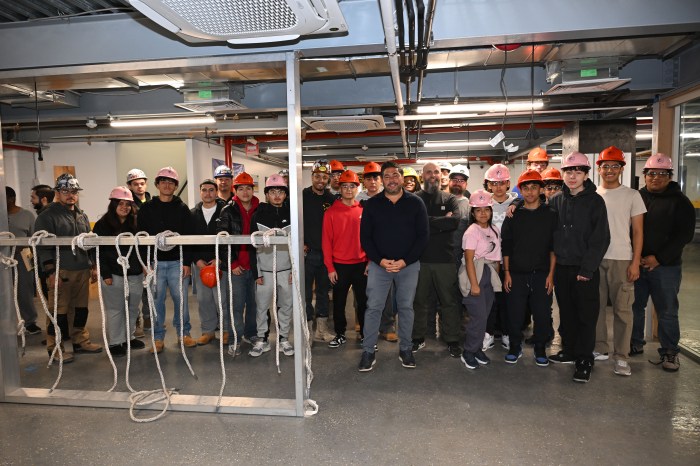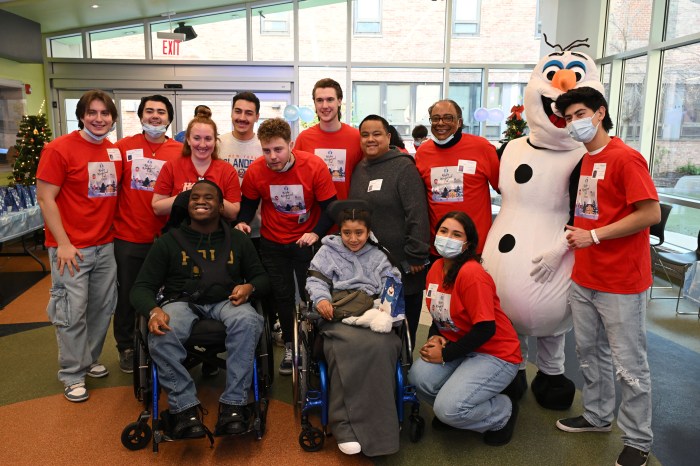In freshly pressed gray slacks and a smooth collared shirt, Karina Mella has the look of a businesswoman down pat.
As Virtual Time Keepers’ CEO, the energetic 17-year-old oversees the entire operation, from the content on their website to the latest sale to making sure everyone’s fulfilling their job requirements.
Mella, of course, isn’t the boss of a real-life company. But, as one of the leaders in Flushing High School’s Virtual Enterprise classes, she’s close to it.
Here, Flushing students aren’t acting out the world of business, but living it.
Advised by the school’s business education teacher, Irvin Wortman, there are three businesses - or classes - that meet every day for an hour: Sports Finest, Virtual Time Keepers and Infinite Broadcasting. Each group is divided into five factions just like an actual company, such as administration, accounting/finance, marketing, sales/purchasing and human resources.
Virtual Enterprises was started 10 years ago, when Iris Blanc, now the director of Virtual Enterprises, International brought the idea over from Austria. The district’s superintendent at the time, John Lee, proposed the program to Flushing Principal Cornelia Gutwein, who loved it and brought the subject to Wortman. At the start, there were just eight students; now there are nearly 100.
In September of 2005, the outspoken billionaire businessman Donald Trump criticized the New York City school system for not preparing its students for the business world in The Trump Blog, featured on Trump University’s website.
“Students have so little preparation; they’re usually starting from scratch, learning the most basic ideas,” he said. “Yet, imagine the advantage that these future business leaders would have if they had the chance to develop business skills early on in their education.”
Obviously, Trump had never heard of Virtual Enterprises. Wortman was sent a copy of his blog from the Business Council of New York State, Inc. and immediately attempted to contact Trump on several occasions without success.
“I’m trying to show him we do everything he says we don’t in the Virtual Enterprises program,” Wortman said.
Like a real-life business, there are leaders: a CEO runs the entire ship and there is a president and vice president for each department. Students may move from one job to another based on interest and skill. They learn to handle information, to make decisions, work in groups and on their own, to set up initiatives and evaluate.
“It’s the kids running an actual business,” Wortman said. “It’s 100 percent students.”
Simply, the only difference between the actual business and the one run at Flushing and countless other Virtual Enterprise high school programs around the world, is they don’t deal with actual money or products.
But that is where the differences end. Working with other programs in the city and across the country and even the world, they buy and sell products through online banking.
The program is a comprehensive approach towards teaching and learning in the business world. For example, accounting produces W2 and W3 forms for all of its workers while marketing is responsible for creating and sending, via email or fax, fliers and emails of their latest product to other companies … or high schools.
The program not only develops responsibility and keen business sense, but opens up internships and the opportunity to take college-level classes at DeVry, Baruch and Queensborough through scholarships from Virtual Enterprise, International.
Similar to the professional world, the program asks for more from their CEO’s, usually seniors. Mella, for instance, had to teach herself Adobe Photoshop, a vital part of the advertising side, because those who had a grasp of it had graduated. She downloaded the program on her computer at home and later taught it to her classmates.
Then there is the issue of new participants. Since the business leaders graduate every spring, the classes go around the school advertising the program. For those interested, signing up doesn’t equate acceptance. Like a real business, all applicants have to create a resume and go through an interview process.
“I was very nervous,” said Julian Alveremja, 18. “It was like applying to a real job.”
But most of all, the program is a progressive way of teaching. “There is no other class I have or probably ever will take that made such an impact in my life,” said Jenny Chan, 17, the assistant CEO of Sports Finest. “By the time I graduate from high school, I will be equipped with leadership qualities, oral presentation skills and vital office knowledge.”



































